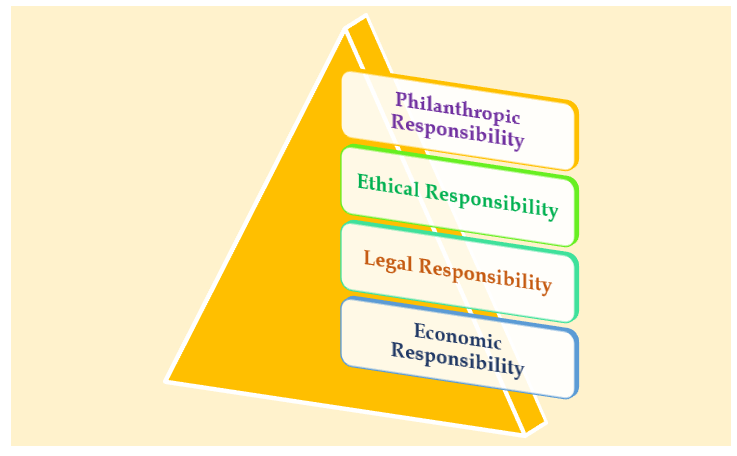Social Responsibility and Profiting? Does it sound like the North Pole and the South Pole? Isn’t social responsibility a mode of welfare that does not focus on profitability? Well, no matter how surprising these questions sound, social responsibility has now become a mode of profiting for many companies.
Profit augmentation nowadays is not only about quality services and great customer relationships; it has gone beyond that. Corporate Social Responsibility is the newly emerged practice companies are relying on to accelerate their revenue growth. Discover how these two relate and reconcile to serve the best interests of companies and communities.
Corporate Social Responsibility: An Insight
Corporate Social Responsibility, or CSR, is a buzzing word within the private sector. So, what do we understand about this term?
Corporate Social Responsibility is best understood through the lenses of Carroll’s CSR Pyramid. As per Caroll, CSR involves conforming to basic social rules covering both law and ethical custom by businesses. His CSR pyramid clearly categorizes components of CSR, including- economic, legal, ethical, and philanthropic responsibilities. A company needs to be financially viable, legally compliant, ethically mandated, and philanthropic in nature to fulfill all the aspects of social responsibilities.
Why CSR is Important?
After understanding what CSR is? The next question would be, why CSR?
A company can enjoy multiple benefits from integrating CSR into its business model. Some of the crucial benefits are-
- Employee Engagement: CSR allows employees to volunteer in community welfare activities, giving them a purpose beyond achieving financial targets. This eventually contributes to their increased engagement with their job and to company productivity.
- Improved bottom-line finance: Financial stakeholders look for good returns on their investments, and buy-in leadership for CSR programs is capable of ensuring that.
- Attracting more investors: Investors in today’s global business world are focusing on sustainable investments to ensure profitable financial returns, and CSR attracts sustainable investments to brands.
- Supporting local and global communities: As the name defines, CSR means operating in a manner that benefits communities socially. The CSR initiatives aligned with organizational values hold the purpose of supporting communities both locally and globally.
- Retention of loyal customers: Loyal customers are desired by every organization. Today’s customers are more aware of sustainability and welfare, and through CSR, more customers can be retained by a business.
- Brand Awareness: Outstanding CSR activities can give a company excellent media coverage, which in turn boosts brand awareness and affinity.
Strategies to Reconcile CSR and Profit Maximization
Now, to answer the most important question, ‘How do companies today reconcile profit maximization with corporate social responsibility?’ let us look into the strategies today’s companies rely on.
Strategy 1: Sustainable Initiatives
By integrating sustainability at each scale of business operations, from manufacturing to supply chain, companies are reducing waste. Companies nowadays are prioritizing environmental and social impact in their operations. For example, Manufacturing companies are embracing sustainability in their manufacturing process to minimize waste generation. Promoting eco-friendly initiatives influences social development as well, encouraging people to engage in developmental activities. Such initiatives enhance brand image, resulting in increased revenue growth.
Strategy 2: Aligning Business Values with Ethical Practices
In order to reconcile profit maximization with corporate social responsibility, companies must align their ethical practices with their business values. Ethical considerations are incorporated by leaders into their decision-making process to ensure they work ethically. An ethical business is likely to attract customer loyalty, causing its profitability to reach a new height.
Strategy 3: Engaging in Philanthropic Activities
Philanthropic activities like donating to non-profit organizations, events-sponsoring, and organizing volunteer days enable a company to contribute to community and society development. Supporting education, health, and other social factors improves community relations, attracting more people to the brand for profit generation.
Strategy 4: Fostering Workplace Diversity and Inclusion
Diversity and inclusion have become a concern for businesses to mitigate issues of workplace discrimination, abuse, gender gap, and more. Companies focusing on addressing these issues and fostering inclusion in their workplace are likely to retain more talent. Talented employees drive more customers to increase sales.
Strategy 5: Valuing Employee Well-being
By keeping ethics and legal compliance at the forefront of CSR activities, companies are crafting strong employee policies to ensure they are safe, secure, and valued. Happier employees are productive employees who take on the organizational culture to work more dedicatedly. The more dedicated the employees are, the more they are to drive sales growth.
CSR is not limited to environmental activities only; it encompasses a wider area. Starting from organizational culture to organizational operations, from sustainable practices to philanthropic activities, CSR has a multifaceted influence on organizational profit. Resonating CSR activities with the company values can successfully reconcile it with profit maximization.











